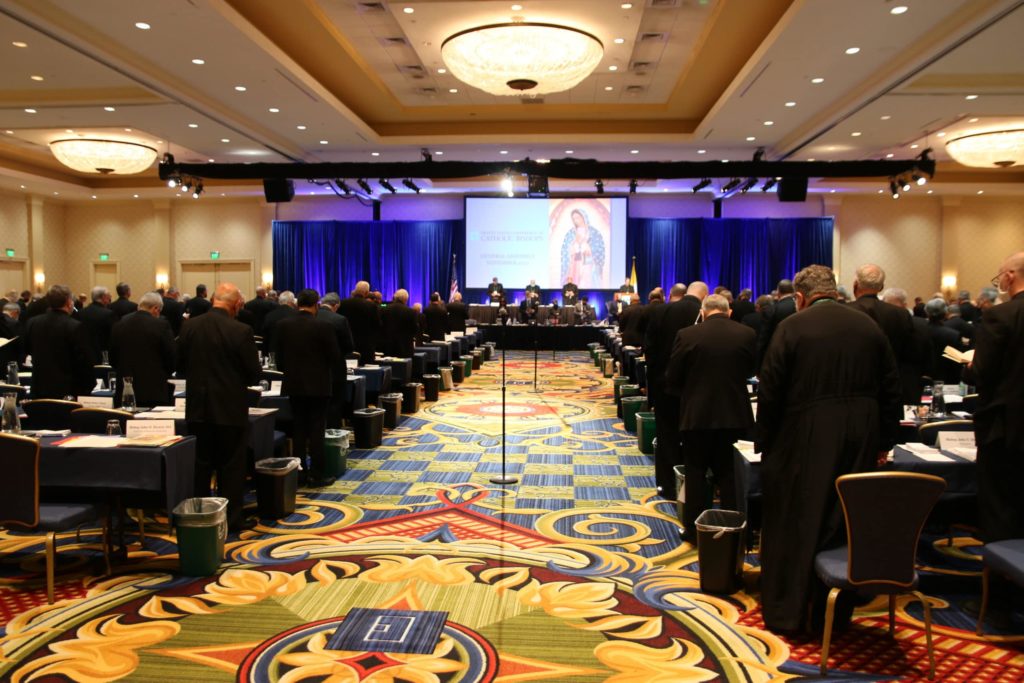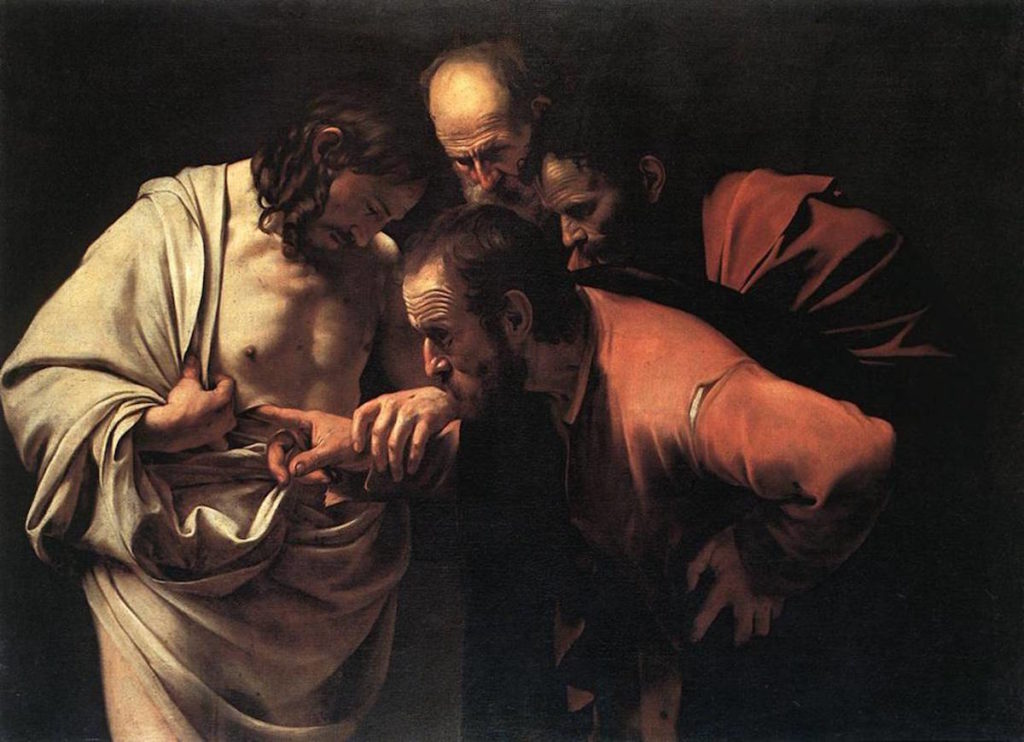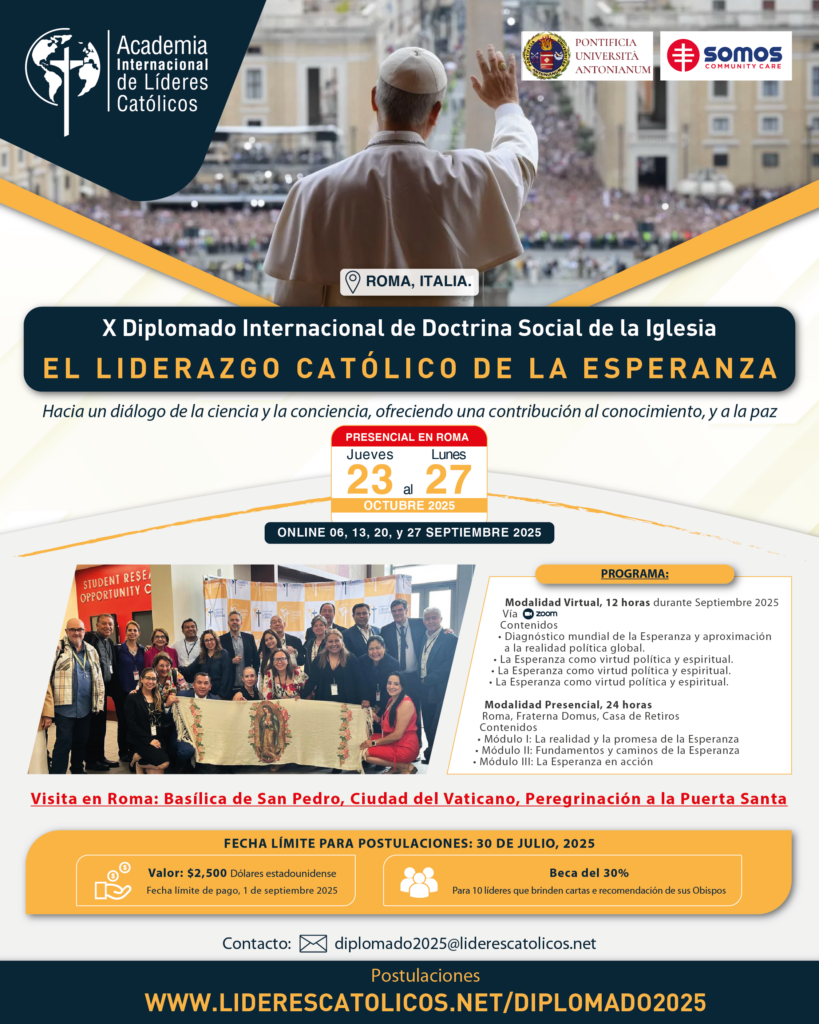US Bishops Agree on Document About Eucharist
Among the Topics Addressed: Youth Pastoral Care. Synodality, Family Pastoral Care, Migrants, and Social Commitment

Social communicator Enrique Soros, an Exaudi collaborator, offers this article on the recent Plenary Assembly of the Conference of Catholic Bishops of the United States (USCCB), where he explains how the Bishops finally agreed on a document about the Eucharist.
* * *
The fall Assembly of the United States Bishops ended yesterday. This year it lasted two days, not three, as is generally the case. The topic this year, which shook the Episcopate and part of the Church of the United States, was the desire of an important group of Bishops to issue a document making it clear that politicians who openly accept abortion, cannot receive communion. That was the exclusive topic of the first day of their June Assembly debate, which was held online.
Finally, by an overwhelming majority, with 222 votes in favor, eight against, and three abstentions, the Bishops approved the document entitled “The Mystery of the Eucharist in the Life of the Church.” The document was written by the Doctrine Committee, headed by Bishop Kevin Rhoades of the Fort Wayne-South Bend diocese, in the state of Indiana. This sealed a chapter full of intense controversies regarding the inclusion in the document that a politician, who openly approves abortion, must not receive Communion, in direct reference to President Joe Biden and the Speaker of the House of Representatives, Nancy Pelosi. The document did not include an allusion to these topics.
Eucharistic Revival
According to many observers, with this result, the Bishops succeeded in lowering the tone of partisan ideological discussions with religious implications. Thus the document fits in with the Eucharistic Revival initiative, which Bishop Andrew Cozzens, recently appointed by Pope Francis, Bishop of Crookston, Minnesota, President of the USCCB’s Evangelization and Catechesis Committee, presented yesterday to the Bishops’ Plenary Assembly, which was approved by 201 votes against 17 and five abstentions.
 The motto of the Eucharistic Revival is “My flesh for the Life of the World” (John 6:51). Its mission is to “renew the Church through a propound living relationship with the Lord Jesus Christ in the Holy Eucharist.” Its vision is of “a Movement of Catholics in the United States, healed, converted, formed and united for an encounter with Jesus in the Eucharist and sent on mission ‘to take life to the world.’”
The motto of the Eucharistic Revival is “My flesh for the Life of the World” (John 6:51). Its mission is to “renew the Church through a propound living relationship with the Lord Jesus Christ in the Holy Eucharist.” Its vision is of “a Movement of Catholics in the United States, healed, converted, formed and united for an encounter with Jesus in the Eucharist and sent on mission ‘to take life to the world.’”
Copious resources will be offered so that the initiative achieves great pastoral success. Its culmination will be the Eucharistic Congress, to be held in Indianapolis from July 17-21, 2024, where the participation of tens of thousands of faithful is expected.
Details of this initiative will be published on this page shortly.
Journeying Together, Indispensable Youth Pastoral Care
 Archbishop Nelson Perez of Philadelphia, President of the Cultural Diversity Commission in the Church, presented the program “Journeying Together,” which stands for a national Catholic inter-cultural meeting, geared to the youth pastoral care of adolescents – for the USCCB, a section called “youth,” which includes young people up to 18 years old –, and young adults — for the USCCB: from 19 to 39 years of age –.
Archbishop Nelson Perez of Philadelphia, President of the Cultural Diversity Commission in the Church, presented the program “Journeying Together,” which stands for a national Catholic inter-cultural meeting, geared to the youth pastoral care of adolescents – for the USCCB, a section called “youth,” which includes young people up to 18 years old –, and young adults — for the USCCB: from 19 to 39 years of age –.
“Journeying Together” is a program that offers a great variety of resources presented with utmost creativity, including meetings for young people and youth pastoral agents; reflection on the theme of the 2018 Synod for Young People, on the Post-Synodal Apostolic Exhortation Christus Vivit, and on the National Dialogue, a survey that included, among others, 10,000 young people.
Archbishop Perez presented the national meeting Journeying Together, which will be held in Chicago from June 23-26, 2022. He asked for support for the event, as well as sponsors and prayer. The Bishops’ Assembly having concluded, Bishop Arturo Cepeda, Auxiliary of Detroit, Michigan, assumed the post of the successor to Archbishop Perez. Additional information will be published opportunely on this page.
National Pastoral Framework for Marriage and Family Life
 For his part, Archbishop Salvatore Cordileone, President of the Commission on the Laity, Marriage, Family Life and Youth, presented to the Bishops’ Assembly the “National Pastoral Framework for Marriage and Family Life,” coinciding with the Amoris Laetitia Year, the Catholic Church’s universal Year of the Family (2021-2022), based on the message of Pope Francis’ Post-Synodal Apostolic Exhortation “Amoris Laetitia, The Joy of Love.”
For his part, Archbishop Salvatore Cordileone, President of the Commission on the Laity, Marriage, Family Life and Youth, presented to the Bishops’ Assembly the “National Pastoral Framework for Marriage and Family Life,” coinciding with the Amoris Laetitia Year, the Catholic Church’s universal Year of the Family (2021-2022), based on the message of Pope Francis’ Post-Synodal Apostolic Exhortation “Amoris Laetitia, The Joy of Love.”
The document includes four pillars of the family: prayer, formation, accompaniment, and promotion of marriage. It suggests three areas for attention: to educate, to motivate, and to commit oneself. Additional details are available on this page, where the document can be obtained digitally.
Synodality: Communion, Participation, and Mission
Bishop Daniel Flores of Brownsville, President-Elect of the Doctrine Committee, presented the theme that concerns profoundly the universal Church: Synodality. Pope Francis has called for a Synod on synodality, so that the People of God, the laity together with their Pastors, discern in prayer and with an open heart the Voice of God in the signs of the times.
The path is one of communion, participation, and mission; the way to take part is to listen to one another, to pray together, and to discern together. Prayer opens the soul to God’s presence. Hence Bishop Flores, quoting Pope Francis, said “if the Spirit isn’t present, there won’t be a Synod,” stressing that it’s not about reasonings, but about a process of the heart, enriched by prayer.
“The synodal process generates and empowers a Church that listens, hearing the anxieties, fears and wounds, affirming hopes and aspirations, and motivating to participation,” said Bishop Flores.
Synodality in Hispanic Pastoral Care
 The synodal theme is becoming effective in several dioceses of the United States, although with different degrees of participation. Observed in national Hispanic pastoral care is great commitment to listening, community discernment, and prayer. This is the case, for example, of the Hispanic Youth Pastoral Care Network, of the National Catholic Association of Diocesan Directors of Hispanic Pastoral Care, which in its annual meetings has worked in-depth on the theme. It’s also the case of the National Catholic Council of Hispanic Ministry, with brings together numerous national institutions, and is organizing the “Roots and Wings’ Congress, which will be held in Washington, D.C. from April 26-30, 2022, whose themes will be analyzed under the topic of the Synodal Journey, with the motto: “Prophetic Voices, Bridges for a New Era.”
The synodal theme is becoming effective in several dioceses of the United States, although with different degrees of participation. Observed in national Hispanic pastoral care is great commitment to listening, community discernment, and prayer. This is the case, for example, of the Hispanic Youth Pastoral Care Network, of the National Catholic Association of Diocesan Directors of Hispanic Pastoral Care, which in its annual meetings has worked in-depth on the theme. It’s also the case of the National Catholic Council of Hispanic Ministry, with brings together numerous national institutions, and is organizing the “Roots and Wings’ Congress, which will be held in Washington, D.C. from April 26-30, 2022, whose themes will be analyzed under the topic of the Synodal Journey, with the motto: “Prophetic Voices, Bridges for a New Era.”
The Migrants: Human Faces, Human Tragedies
 Auxiliary Bishop Mario Dorsonville of Washington, President of the Migration Committee, recalled that he sent all the country’s Bishops the document on “Migratory Reform and the Voice of the Church: To Understand the Problem and Seek Solutions.” He encouraged them to read the document carefully, examining the statistics and data it presents but, more than anything, to see the human faces, the human tragedies that lie behind the numbers, and begged them to commit themselves with advocacy, prayer, and accompaniment of the migrants, who have very difficult stories, so that they can finally be protected by the United States’ laws.
Auxiliary Bishop Mario Dorsonville of Washington, President of the Migration Committee, recalled that he sent all the country’s Bishops the document on “Migratory Reform and the Voice of the Church: To Understand the Problem and Seek Solutions.” He encouraged them to read the document carefully, examining the statistics and data it presents but, more than anything, to see the human faces, the human tragedies that lie behind the numbers, and begged them to commit themselves with advocacy, prayer, and accompaniment of the migrants, who have very difficult stories, so that they can finally be protected by the United States’ laws.
The USCCB’s Social Programs
Other projects and initiatives were presented yesterday to the Bishops’ Plenary Assembly, among them “Walking with Mothers in Need,” a project to support pregnant mothers and <their> babies; the Catholic Campaign for Human Development, which granted aid amounting to US$440 million, over the last 50 years, to 12,000 communities; the Catholic Relief Services (CRS); U.S. Catholic Charities, which gave US$5,100 million to needy people this year, and CLINIC, the Catholic Network of Legal Immigration.
Translation by Virginia M. Forrester
Related

Saint Thomas the Apostle: In the face of doubts, faith
Eugenio Bujalance
03 July, 2025
5 min

The Barbastro-Monzón Diocese Submits a Proposal Regarding the Torreciudad Complex to the Holy See
Exaudi Staff
01 July, 2025
3 min

The Only St. Andrew Bobola Shrine in the U.S. with the Pope’s Blessing
Exaudi Staff
01 July, 2025
3 min

Formation and Faith in Jubilee 2025: The International Academy of Catholic Leaders and Antonianum University Announce the 10th International Diploma Program in Rome
Academia de Líderes Católicos
30 June, 2025
2 min
 (EN)
(EN)
 (ES)
(ES)
 (IT)
(IT)

